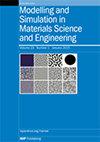研究拓扑结构对spinodal微结构弹性的影响
IF 2.4
4区 材料科学
Q3 MATERIALS SCIENCE, MULTIDISCIPLINARY
Modelling and Simulation in Materials Science and Engineering
Pub Date : 2023-09-26
DOI:10.1088/1361-651x/acfd48
引用次数: 0
摘要
通过自组装工艺形成的Spinodal拓扑结构具有独特的力学性能,如光滑和非周期性,使其具有抗屈曲和制造缺陷的能力。虽然广泛的研究集中在其机械行为上,但对其复杂拓扑结构的影响的理解却有限。本研究旨在通过分析标度律来研究用计算同调表征的二维旋轴拓扑的拓扑特征与其弹性响应之间的关系。通过灵敏度分析来确定各种拓扑特征对杨氏模量和泊松比的影响。计算同调技术被用于测量Betti数,Betti数表示在spinodal拓扑中环路和不相交区域的数量。此外,这些技术也被用来确定这些环和区域的大小。在研究的所有拓扑特征中,环路的数量和大小对弹性性能的影响最大,特别是杨氏模量和泊松比。理解控制二维spinodal拓扑弹性响应方式的规则对于理解它们的机械行为和优化它们的性能至关重要。研究结果强调了某些拓扑特征,特别是环路的数量和大小对材料性能的重大影响。这些知识为设计和工程独立结构提供了有价值的见解。& & #xD;本文章由计算机程序翻译,如有差异,请以英文原文为准。
Investigating the influence of topology on elasticity in spinodal microstructures
Abstract Spinodal topologies formed through self-assembly processes exhibit unique mechanical properties, such as smoothness and non-periodicity, making them resistant to buckling and manufacturing defects. While extensive research has focused on their mechanical behavior, limited attention has been given to understanding the impact of their complex topology. This study aims to investigate the relationship between the topological features of two-dimensional spinodal topologies, characterized using computational homology, and their elastic response by analyzing scaling laws. Sensitivity analysis was conducted to determine the influence of various topological characteristics on Young's modulus and Poisson's ratio. Computational homology techniques were used to measure Betti numbers, which represent the number of loops and disjoint regions in the spinodal topologies. Additionally, these techniques were also employed to determine the size of these loops and regions. Among all the topological characteristics studied, the number and size of loops were found to have the highest influence on the elastic properties, specifically Young's modulus and Poisson's ratio. Understanding the rules that govern the way two-dimensional spinodal topologies respond elastically is crucial for comprehending how they behave mechanically and for optimizing their performance. The research findings highlight the significant impact of certain topological features, specifically the number and size of loops, on the material properties. This knowledge provides valuable insights for designing and engineering spinodal structures.
求助全文
通过发布文献求助,成功后即可免费获取论文全文。
去求助
来源期刊
CiteScore
3.30
自引率
5.60%
发文量
96
审稿时长
1.7 months
期刊介绍:
Serving the multidisciplinary materials community, the journal aims to publish new research work that advances the understanding and prediction of material behaviour at scales from atomistic to macroscopic through modelling and simulation.
Subject coverage:
Modelling and/or simulation across materials science that emphasizes fundamental materials issues advancing the understanding and prediction of material behaviour. Interdisciplinary research that tackles challenging and complex materials problems where the governing phenomena may span different scales of materials behaviour, with an emphasis on the development of quantitative approaches to explain and predict experimental observations. Material processing that advances the fundamental materials science and engineering underpinning the connection between processing and properties. Covering all classes of materials, and mechanical, microstructural, electronic, chemical, biological, and optical properties.

 求助内容:
求助内容: 应助结果提醒方式:
应助结果提醒方式:


